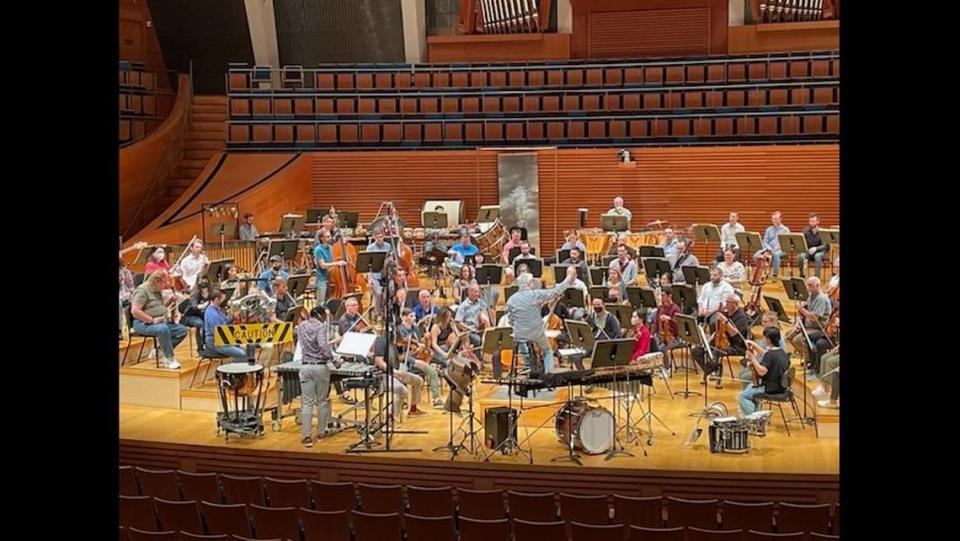First Black musician on tenure track at KC Symphony lost his job. Was it due to racism?
- Oops!Something went wrong.Please try again later.
In early May, internationally acclaimed percussionist Josh Jones sat unemployed and holding back tears inside the Kansas City home he had purchased to be closer to his mother.
Only weeks before, he had felt like a very different Josh Jones: Principal percussionist of the Kansas City Symphony, and almost, the first Black man to receive tenure in the institution’s 40-year history.
But that did not happen.
Now, the 31-year-old has been denied tenure, leaving him with no job and no health care with less than a year left in his cancer treatment.
He says the symphony held him, the only Black musician brought in for a long-term position, to a higher standard than his white counterparts. Jones said he felt isolated and, at times, treated inappropriately by staff due to his race.
In an initial, Nov. 11, 2021, letter assessing Jones’ performance on the tenure track, the symphony’s music director, Michael Stern, repeatedly referred to him as “an exceptional talent” and “an extraordinary citizen in the orchestra and the larger community.”
But as the process continued through follow-up assessments, Stern revealed concerns over Jones’ ability to lead his section of the orchestra, culminating in a final Jan. 26 letter saying “improvement in the various issues… was not sufficient,” and Jones would not be given tenure, which his position relied on.
“You simply did not have the support of your tenure review committee,” the letter said.
Jones denied any of the concerns were brought to him in a timely manner. He also said his organizational and managerial skills had been praised by similarly respected orchestras. In at least one instance, in Kansas City, his supervisors criticized him for assigning music in the style of another well known Black musician, Jones said.
The CEO of the symphony, Danny Beckman, declined to comment on any specific matters relating to Jones, but told The Star “Race is not a factor in these decisions,” in a Friday morning phone call.

Out of 80 musicians employed with the orchestra, Jones was one of three who were Black. The other two members joined in 2022 to fill temporary slots and will need to audition to secure long-term roles, Beckman said.
In the weeks since Jones lost his job in March, thousands have rallied behind him over social media. Many shared messages of support, writing “I stand with Josh.”
The Black Orchestral Network protests the Kansas City Symphony’s denial of Josh Jones’s tenure as Principal Percussion. pic.twitter.com/uiRFrmdzOr
— Black Orchestral Network (@BlackOrchestral) May 9, 2023
Major donors and members of other esteemed orchestras signed letters similarly protesting the decision.
The Black Orchestral Network, a nationwide support system for Black musicians, argues the decision to deny Jones tenure comes as part of a pattern with a deeper history.
Weston Sprott, a Black musician and leader in the network, said the number of Black musicians experiencing denied or delayed tenure is “grossly disproportionate to that of others.”
“We know that Josh’s situation is not isolated. It’s not unique to the Kansas City Symphony. This is something that happens to Black musicians all across the country,” he said.
As of 2014, Black musicians made up 2% of American orchestras.
The percussionist
At 2 years old, Jones could hold a rhythm with just a coat hanger and a spoon.
He mimicked the instruments, often tapping his fingers to the tempo of his parents’ Rocky IV cassette tape.
But while growing up in Chicago, he lived in a neighborhood plagued by gun violence. There was little expectation for him to pursue a career in classical music.
A video by the Detroit Symphony chronicling his achievements shows Jones strolling through his childhood neighborhood as he recalls “not being able to go outside” and “the sounds of gunshots from across the way.”
So Jones stayed inside and listened to music.

By 3 years old he received his first drum set and 10 years later he got paid for playing them at a women’s chorus in a Northbrook, Illinois, school.
Patricia Dash, a member of the Chicago Symphony, offered Jones a percussion scholarship and from there Jones went on to complete a bachelor’s degree at the Depaul School of Music and play for major orchestras in Detroit, Chicago, Pittsburgh and Calgary, Canada.
He was diagnosed with cancer while playing for the Calgary Symphony in 2018. The seven-inch tumor lodged in his lower abdomen was removed a year later. He played his first concerto, a solo composition with an orchestra, about two months after leaving the hospital.
Jones went into remission and doctors shifted focus from treatment to preventing the cancer from returning. With the constant threat of another health scare, he longed to be closer to home.
On March 10, 2020, he auditioned for the Kansas City Symphony.
“Everybody was very supportive and excited I was coming in. I felt welcome,” Jones said, chuckling.

He received a contract and earned the title of “Principal Percussionist,” which entitled him to solos, a leadership role in the percussion section and a chance to be the first Black musician at the symphony with tenure.
According to Kansas City Symphony spokesman Jake Jacobson, Jones was the first Black musician the symphony had ever considered for tenure.
Three years at the symphony
Starting on his first day, July 27, 2020, Jones’ responsibilities included assigning parts to musicians, managing instruments, arranging production with stage crews and leading the percussion section’s performance.
“By the time I got this job I had a really good system… it made it easy to manage and adapt to people’s needs,” Jones said.
As part of his tenure assessment he would receive feedback from Stern, the symphony’s music director, on at least five occasions. Jones received three letters documenting the meetings and the tenure committee’s assessment.
When his probation for tenure started in September 2021, Jones received glowing feedback.
This continued for at least seven months, apart from occasional reminders to keep up with managerial tasks, before the feedback turned negative, with multiple meetings scheduled in May 2022 to discuss Jones’ leadership. In the final eight months before Jones’ tenure was denied, he said, there appeared to be a pattern of withholding concerns about his performance until formal meetings and refusing to listen to his account of events.
During his first meeting in November, Stern said Jones “already added immeasurably to the performance standard and communal culture of the symphony.”

In a letter recounting the assessment, Stern referenced a confusing incident regarding the assigning of parts. Stern surmised that “None of that is an issue for me, at all,” and ended with a reminder to keep the percussion room tidy.
“I have no doubt at all of the extraordinary contributions you are going to make… This is not just my opinion, the committee and all of your colleagues support you completely,” the Nov. 11, 2020 letter said.
So work went on as usual, Jones said.
The second meeting, scheduled for May 2022, turned into multiple discussions on May 25 and May 27. Jones quickly became discouraged, he said, because Stern refused to listen to context or his account of events that spurred negative feedback.
“That’s when I realized the process might start to turn against me for things outside my control,” he said.
In the meeting, Stern criticized Jones’ ability to communicate with colleagues, more confusion over past music assignments and the way they were distributed.
“Problems continue to center around your leadership of your section,” Stern said in a letter assessing Jones’ performance.
Jones found the feedback interesting, he said, since one of the music assignments Jones distributed that Stern used to criticize his leadership had been based on the work of the “very first African American Principal Percussionist in America.”
When Jones attended his final meeting on Jan. 10 Stern told him he would not receive tenure.

“Throughout the first months of this season there continued to be serious issues,” Stern said in a Jan. 26 letter, referring to how parts had been assigned, managed and communicated.
“You were not able to correct course and win the confidence of the committee. That is truly my biggest regret.”
For Jones, the decision felt unjustified.
“It made me feel as if I had to be perceived as perfect and perform at a level no one in the country would even consider appropriate,” he said. “And the director didn’t want to see my evidence refuting it.”
The Black musician
On multiple occasions during his time at the Kansas City Symphony, Jones said he was treated differently because of the color of his skin.
Security staff questioned whether his ID card was authentic in his first and second year at his position, he said, and took precautions, such as scanning him through a metal detector, which other musicians did not have to do.
“One day when I came in, one of the security guards showed me a picture of a man with a hoodie and jeans and asked if that was me,” he said. “We have some instances where homeless people come through the parking garage and somehow get into the building.”
In other instances, Jones felt used. He appeared on multiple brochures for the symphony and was asked to be one of the main musicians in an outreach campaign playing live music for many low-income and predominantly Black communities in the metro area.
Jones said there was no support outlet or person in the symphony with whom he could discuss his concerns.

When asked whether the orchestra had any initiatives to support diversity or training to keep race from impacting personnel decisions, Beckman, the symphony’s CEO, said they are still “looking for people who might be able to help think about this.”
“We launched a DEI task force to look at that and assess what we need to be doing,” he said. “I’d say we’ve been at that work for the last year, year and a half maybe… But we’re pretty early on that journey,” he said.
He referred to the outreach Jones had been a part of as one step in an ongoing effort to “try and grow the feeling that we belong to all of Kansas City.”
Sprott, with the Black Orchestral Network, which reached out to Jones shortly after his tenure was denied, said many Black musicians feel isolated in an orchestra setting.
Musicians going through tenure, especially Black musicians, should be given an opportunity to advocate for themselves to the tenure committee and discuss their various experiences, Sprott said. And they should have an advocate alongside them during the probationary period to provide support.
“The likelihood that anyone in senior leadership has a shared identity with you is very unlikely,” Sprott said.
Jones hopes similar changes are made to support Black musicians at the symphony.
But in recent weeks, he’s felt worried, unsure whether he will be able to find health care as a cancer patient or someday get his job back.
“This has always happened,” Jones said. ”Whether it’s people being upset that I’m playing music the grad students are playing or getting called to play with the Chicago Symphony as a freshman. We are always told you have to be four times as good to get halfway. But then you’re four times as good as the white person.”
“So you’re damned if you do, damned if you don’t.”

